 Petzlover
Petzlover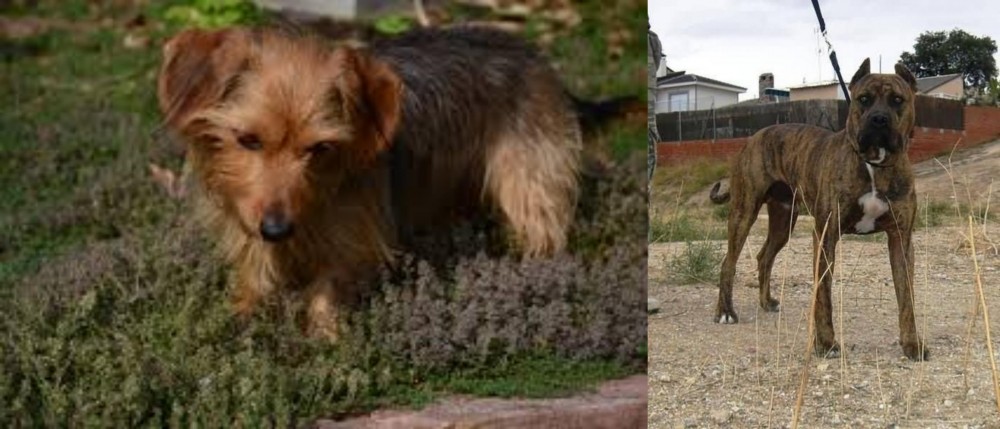 Dorkie is originated from United States but Perro de Toro is originated from Spain. Dorkie may grow 41 cm / 16 inches shorter than Perro de Toro. Dorkie may weigh 34 kg / 74 pounds lesser than Perro de Toro. Both Dorkie and Perro de Toro has almost same life span. Dorkie may have less litter size than Perro de Toro. Both Dorkie and Perro de Toro requires Low Maintenance.
Dorkie is originated from United States but Perro de Toro is originated from Spain. Dorkie may grow 41 cm / 16 inches shorter than Perro de Toro. Dorkie may weigh 34 kg / 74 pounds lesser than Perro de Toro. Both Dorkie and Perro de Toro has almost same life span. Dorkie may have less litter size than Perro de Toro. Both Dorkie and Perro de Toro requires Low Maintenance.
 Dorkie Terriers originate from the United States of America. The small Dorkie, a cross between the Dachshund and the Yorkshire Terrier has a short history, unlike the two dog breeds that were bred to bring him about.
Dorkie Terriers originate from the United States of America. The small Dorkie, a cross between the Dachshund and the Yorkshire Terrier has a short history, unlike the two dog breeds that were bred to bring him about.
These dog breeds were both used for hunting small animals but the Dorkie today is essentially a companion dog. The International Designer Canine Association started recording registration of the Dorkie from 2009.
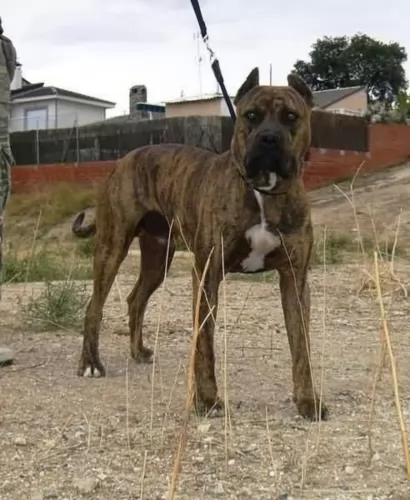 The rare Spanish Perro de Toro seems to have unclear origins, with some saying the dog is a direct descendant of the Toulouse Mastiff, while others say that the dog was developed by crossing the Alano with the Dogue de Bordeaux.
The rare Spanish Perro de Toro seems to have unclear origins, with some saying the dog is a direct descendant of the Toulouse Mastiff, while others say that the dog was developed by crossing the Alano with the Dogue de Bordeaux.
The dog hails from Spain and was once used as a fighting kind of dog but today it is essentially a family pet. The dog is an ancient breed, an ancestor of many of the molosser breeds that are around today.
 The Dorkie is a small hybrid breed standing at 13 – 23cm in height and weighing 2 – 6kg. The Dorkie mostly comes with long, straight hair but there are however Dorkies who have the short hair of the Dachshund.
The Dorkie is a small hybrid breed standing at 13 – 23cm in height and weighing 2 – 6kg. The Dorkie mostly comes with long, straight hair but there are however Dorkies who have the short hair of the Dachshund.
The Dorkie is hypoallergenic, making them the ideal pet for allergy sufferers. They have floppy ears, a long body and short legs. The tail is long and furry. Most times they come in the Yorkshire Terrier colors of black and tan, but this can also vary.
The Dorkie is a loving, loyal, happy little dog who makes an excellent family dog. Although he isn’t looked upon as your typical lap dog, it is what he is really, as he loves nothing more than to be curling up on your lap or as close to you as he can get.
He loves spending time with his human family and is a social, extrovert kind of dog. Because he is also alert, he will do a good job of alerting his family to danger. He is good with children, but because of his smallness, rough children will need to be careful in rough and tumble games as he could get injured.
Even with a small dog like this, he will need training and socialization otherwise he can become a yapper, which comes from the Dachshund side. Training makes him obedient and relaxed around visitors in the home, and because he is an intelligent breed, he is easy to train and is a great dog for first time dog owners.
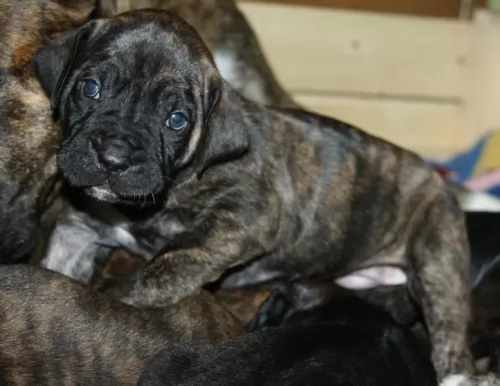 This is a strong, powerful, large breed of dog, making a good watchdog and guardian. He can be anything from 56 to 64cm in height and weigh between 34 and 40kg.
This is a strong, powerful, large breed of dog, making a good watchdog and guardian. He can be anything from 56 to 64cm in height and weigh between 34 and 40kg.
The nose of the dog is broad and black, the ears are set high and droop over slightly,making them floppy ears, but they have always been cropped to stand up erect.
He's a sturdy dog and the tail is fairly thick at the base, tapering to a point. These days it tends to be undocked and left long. The neck is strong and powerful too and the head brachycephalic. The short coat includes colors such as yellow, grey, fawn and red with the black mask.
The Spanish Bulldog looks fairly intimidating and he will certainly need training and socialization if he is to be obedient and well behaved.
He isn’t aggressive but is confident, dominant, fearless, loyal and also loving towards his owner. He is devoted towards his human family and is good with children. Like any mastiff type breed, he will need a firm, kind, consistent, patient owner. This is the kind of owner who will understand this breed type and take time out with him to exercise him and provide him with mental and physical stimulation so as to prevent boredom.
 Dorkies are easy going little dogs and adapt easily to life in the city or in the country.
Dorkies are easy going little dogs and adapt easily to life in the city or in the country.
Ideally they are inside dogs, feeling happy and content around their human family. They love adults and children and will get on well with other pets in the home too.
They are quite active little dogs and will thrive on games inside the home or outside in the garden. He may be small, but you can put him on a leash and take him for walks.
They make excellent pets and are only too happy to become a devoted and loyal family member of yours.
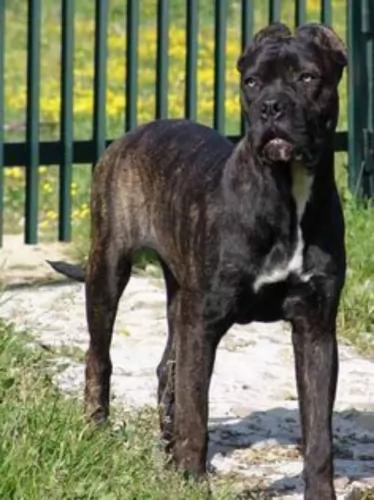 Contrary to what many people think, the temperament of the Perro de Toro is calm and well balanced. This is a reliable, loving, loyal dog who wants to protect his human family.
Contrary to what many people think, the temperament of the Perro de Toro is calm and well balanced. This is a reliable, loving, loyal dog who wants to protect his human family.
He gets on well with children and with pets in the home and when trained and socialized, this intelligent dog is well mannered, obedient and sometimes even submissive.
True, the Perro de Toro has a history of being involved in all kinds of things, from hunting to fighting and also being a working dog, but he is now waiting to show you what a splendid pet he can be if he is raised by the right kind of people.
 The Dorkie, being a cross-breed, is a healthy dog and with good care can live t be 10 – 13 years of age. Nonetheless he is still prone to genetic problems and he can inherit traits from both parents.
The Dorkie, being a cross-breed, is a healthy dog and with good care can live t be 10 – 13 years of age. Nonetheless he is still prone to genetic problems and he can inherit traits from both parents.
A healthy diet will be needed to maintain the Dorkie’s health. You don’t want to overfeed your Dorkie, more so because he is a small dog.
The way you feed a dog can have a massive impact on his health and longevity. Just remember that a dog that is obese will battle to exercise, but also obesity can result in serious health problems, putting strain on the bones and joints too.
You don’t want to feed your dog day after day with kibble, and adding in some cooked rice, vegetables and chicken can just give him a more varied diet. Raw meat can also be included from time to time. Always ensure that there is fresh, cool water available to him.
The most common symptoms of an allergy is skin irritation – your pet will be constantly scratching and licking. Some skin conditions with your Dorkie can be cleared up quickly while some might be so severe as to require lifelong treatment.
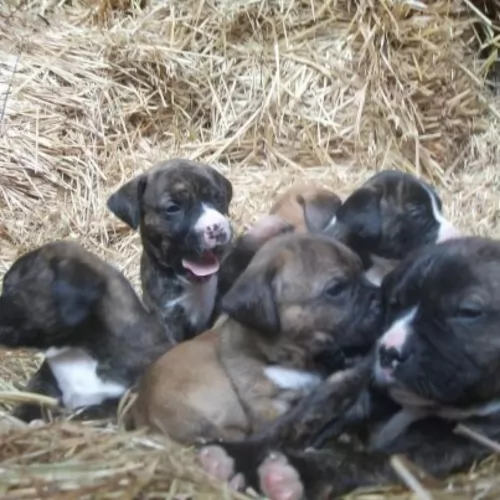 This is a dog breed that is fit and healthy, but to keep him that way you want to make sure he has enough exercise, love and nutritious food.
This is a dog breed that is fit and healthy, but to keep him that way you want to make sure he has enough exercise, love and nutritious food.
He is not known to suffer from any particular disease, but even so, it is wise to be aware of some of the common dog illnesses that your dog could pick up so you can get veterinary help for him just as soon as possible.
With cancer, cells grow rapidly and invade tissue. Dogs can get any of the many cancers there are. Both hereditary and environmental factors can contribute to the development of cancer in canines. Cancer can show up as lumps, swelling, sores that won’t heal, weight loss and difficulty with breathing.
Heartworms are transmitted from one animal to the next by mosquitoes. These worms live in the heart and pulmonary arteries of an infected animal, travelling through the bloodstream and causing havoc. Heartworm is dangerous and can actually be life threatening. Symptoms include coughing, vomiting, battling to breathe and weight loss.
This is a viral disease that can strike terror in anybody who has seen an animal with rabies. It affects the brain and spinal cord of your dog. It is preventable through means of a vaccine. Once symptoms appear, it is a disease which is nearly always fatal.
 What you feed your pet can play an important role in managing health and skin conditions. Speak to your vet about special quality dog foods that can help reduce skin conditions and other nasty reactions to common, unhealthy food ingredients.
What you feed your pet can play an important role in managing health and skin conditions. Speak to your vet about special quality dog foods that can help reduce skin conditions and other nasty reactions to common, unhealthy food ingredients.
Dorkies are very low maintenance dogs, and they will require a brushing every 2 weeks. Those with longer coats may require some professional grooming. Check their teeth regularly and brush them 2 or 3 times a week. The occasional nail clipping may also be required.
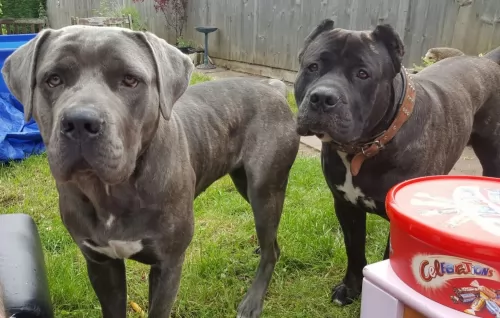 If they are not being used as working dogs, they are family pets, and you need to give them a lot of daily exercise. You will need to give him some walks or hikes and allow him a good run in the country.
If they are not being used as working dogs, they are family pets, and you need to give them a lot of daily exercise. You will need to give him some walks or hikes and allow him a good run in the country.
The Perro de Toro is a short haired dog, and as a moderate shedder, he isn’t going to require too much grooming. A brushing twice a week will help get rid of his hair.
When brushing him, turn it into a bit of a grooming session and check inside his ears, look at his eyes and try to look inside his mouth. He can’t tell you if he has terrible toothache from a rotting tooth and he will rely on you to check his teeth.
Mastiff type dogs need a wholesome diet to remain strong and active. If you are going to feed your pet one of the commercially manufactured dog foods, make sure it is one of the top quality ones.
Avoid the ones that use lots of colorants, preservatives and unhealthy fillers as these can make your dog sick. Try and give him some home-made food which can be added into his dry kibble occasionally.
Boiled chicken, brown rice or pasta and some vegetables such as carrots, sweet potato and spinach chopped up will be excellent for him and will ensure he doesn’t battle with digestive upsets. If you can, every now and then try to include some raw meat for the benefit and health of your pet. Never leave him without a bowl of fresh, cool water.